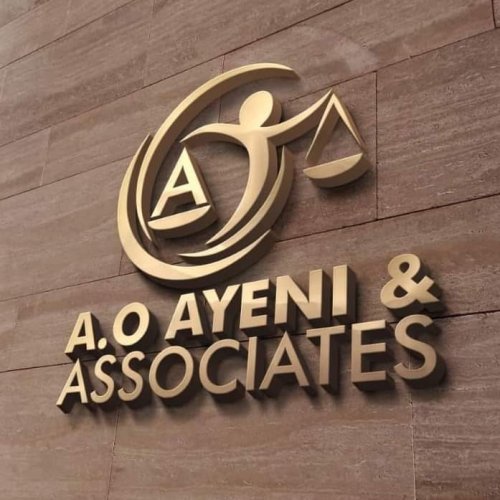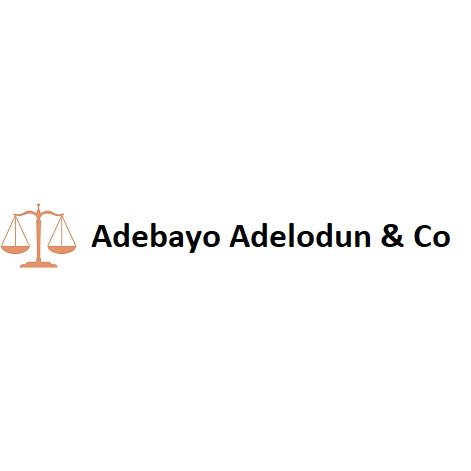Best Natural Resources Lawyers in Abuja
Share your needs with us, get contacted by law firms.
Free. Takes 2 min.
List of the best lawyers in Abuja, Nigeria
About Natural Resources Law in Abuja, Nigeria
Natural Resources Law in Abuja, Nigeria, encompasses the regulation and management of natural resources found within the region. This includes land, minerals, oil, gas, water, and forests. The law is designed to ensure that these resources are used and managed sustainably and equitably, balancing economic development with environmental protection. In Abuja, as the federal capital of Nigeria, natural resources regulations are shaped by federal laws as well as specific policies aimed at protecting the environment and supporting sustainable use.
Why You May Need a Lawyer
There are several situations in which you might require the services of a lawyer specializing in natural resources in Abuja:
- Real estate transactions involving land use for natural resource exploration or development.
- Compliance with environmental regulations for businesses involved in natural resource extraction.
- Resolution of disputes or conflicts over resource ownership or usage.
- Negotiations and drafting of contracts related to natural resources.
- Acquisitions or mergers involving companies in the natural resources sector.
- Litigation related to environmental damage or resource mismanagement.
- Obtaining licenses and permits for resource extraction activities.
Local Laws Overview
The legal framework governing natural resources in Abuja is influenced by both federal and local regulations. Key aspects of the law include:
- The Nigerian Mineral and Mining Act provides guidelines on the exploration and exploitation of minerals.
- The Petroleum Act regulates oil and gas exploration, production, and distribution.
- The Environmental Impact Assessment Act requires assessments for projects likely to affect the environment.
- The Land Use Act governs land ownership and usage, important for resource extraction activities.
- State policies and regulations may also play a role, considering Abuja's status as the Federal Capital Territory.
Frequently Asked Questions
What types of natural resources are found in Abuja?
Abuja is rich in natural resources, including minerals like granite and marble, and is in proximity to larger mining activity areas in Nigeria, such as gold and other minerals. While not a significant oil producer, the regulations affecting oil and gas are relevant here due to the federal influence.
What laws govern mining activities in Abuja?
The Nigerian Mineral and Mining Act is the primary legislation for mining activities, providing regulations for exploration, mining leases, and operational standards to ensure environmental protection.
How can I resolve a land dispute in Abuja?
Land disputes can be resolved through legal proceedings. It is recommended to consult with a lawyer who specializes in land and natural resources law to navigate the complexities of the Land Use Act and other relevant regulations.
Do I need a permit for starting a mining operation in Abuja?
Yes, a mining license is required for exploration and mining operations, as mandated by federal laws governing mineral resources.
What should I do if my business is accused of environmental violations?
It is crucial to consult with a lawyer immediately to address the allegations and work towards compliance with the environmental regulations set out by the Environmental Impact Assessment Act and other relevant laws.
Can foreign companies invest in Nigeria's natural resources?
Yes, foreign investment is allowed, but companies must comply with Nigerian laws, including obtaining the necessary licenses and permits, and possibly partnering with local entities.
How does the Land Use Act affect natural resources extraction?
The Land Use Act centralizes land ownership with the government, which can grant rights of occupancy that may impact resource extraction activities.
What role does the federal government play in Abuja's natural resources management?
As the federal capital, Abuja is under federal jurisdiction, with federal agencies playing a central role in the management and regulation of natural resources.
Can I appeal against a governmental decision regarding natural resources?
Yes, decisions made by governmental bodies can be contested in court. A legal expert can assist with navigating the appeals process.
What steps are involved in acquiring a mining lease in Nigeria?
The process involves applying through the Ministry of Mines and Steel Development, compliance with legal requirements, including environmental assessments, and obtaining the necessary approvals. Legal guidance is recommended to streamline the process.
Additional Resources
For further assistance, consider consulting the following resources:
- Ministry of Mines and Steel Development - oversees mining activities and regulations.
- Nigerian Geological Survey Agency - provides geological information and data.
- Federal Ministry of Environment - responsible for environmental regulation and protection.
- Nigerian Investment Promotion Commission - facilitates foreign investment and business operations in natural resources.
- Nigerian Extractive Industries Transparency Initiative - promotes transparency in resource extraction activities.
Next Steps
If you require legal assistance on natural resources issues, consider the following steps:
- Identify the specific issue or legal assistance needed.
- Contact a lawyer specializing in natural resources or environmental law to discuss your situation.
- Prepare necessary documents and information relevant to your case.
- Work with your lawyer to develop a strategy to address the legal issue.
- Follow legal proceedings or negotiations as advised by your lawyer to protect your interests.
Lawzana helps you find the best lawyers and law firms in Abuja through a curated and pre-screened list of qualified legal professionals. Our platform offers rankings and detailed profiles of attorneys and law firms, allowing you to compare based on practice areas, including Natural Resources, experience, and client feedback.
Each profile includes a description of the firm's areas of practice, client reviews, team members and partners, year of establishment, spoken languages, office locations, contact information, social media presence, and any published articles or resources. Most firms on our platform speak English and are experienced in both local and international legal matters.
Get a quote from top-rated law firms in Abuja, Nigeria — quickly, securely, and without unnecessary hassle.
Disclaimer:
The information provided on this page is for general informational purposes only and does not constitute legal advice. While we strive to ensure the accuracy and relevance of the content, legal information may change over time, and interpretations of the law can vary. You should always consult with a qualified legal professional for advice specific to your situation.
We disclaim all liability for actions taken or not taken based on the content of this page. If you believe any information is incorrect or outdated, please contact us, and we will review and update it where appropriate.

















